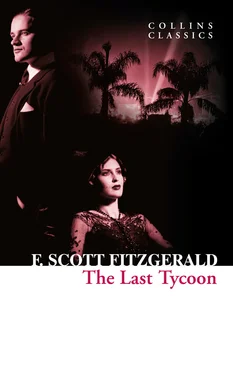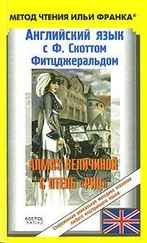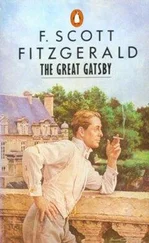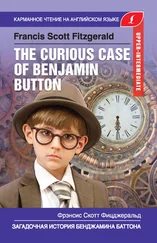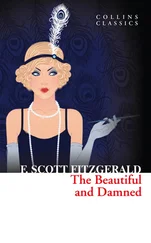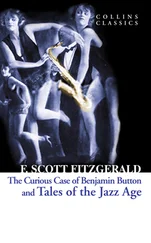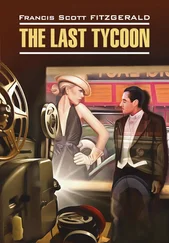“Robby’ll take care of everything when he comes,” Stahr assured Father. He turned to me. “Now there’s a man—that Robinson. He was a trouble-shooter—fixed the telephone wires in Minnesota blizzards—nothing stumps him. He’ll be here in a minute—you’ll like Robby.”
He said it as if it had been his lifelong intention to bring us together, and he had arranged the whole earthquake with just that in mind.
“Yes, you’ll like Robby,” he repeated. “When do you go back to college?”
“I’ve just come home.”
“You get the whole summer?”
“I’m sorry,” I said. “I’ll go back as soon as I can.”
I was in a mist. It hadn’t failed to cross my mind that he might have some intention about me, but if it was so, it was in an exasperatingly early stage—I was merely “a good property”. And the idea didn’t seem so attractive at that moment—like marrying a doctor. He seldom left the studio before eleven.
“How long,” he asked my father, “before she graduates from college. That’s what I was trying to say.”
And I think I was about to sing out eagerly that I needn’t go back at all, that I was quite educated already—when the totally admirable Robinson came in. He was a bowlegged young redhead, all ready to go.
“This is Robby, Cecilia,” said Stahr. “Come on, Robby.”
So I met Robby. I can’t say it seemed like fate—but it was. For it was Robby who later told me how Stahr found his love that night.
Under the moon the back lot was thirty acres of fairyland—not because the locations really looked like African jungles and French chateaux and schooners at anchor and Broadway by night, but because they looked like the torn picture books of childhood, like fragments of stories dancing in an open fire. I never lived in a house with an attic, but a back lot must be something like that, and at night of course in an enchanted distorted way, it all comes true.
When Stahr and Robby arrived, clusters of lights had already picked out the danger spots in the flood.
“We’ll pump it out into the swamp on Thirty-Sixth Street,” said Robby after a moment. “It’s city property—but isn’t this an act of God? Say—look there!”
On top of a huge head of the Goddess Siva, two women were floating down the current of an impromptu river. The idol had come unloosed from a set of Burma, and it meandered earnestly on its way, stopping sometimes to waddle and bump in the shallows with the other debris of the tide. The two refugees had found sanctuary along a scroll of curls on its bald forehead and seemed at first glance to be sightseers on an interesting bus-ride through the scene of the flood.
“Will you look at that, Monroe!” said Robby. “Look at those dames!”
Dragging their legs through sudden bogs, they made their way to the bank of the stream. Now they could see the women, looking a little scared but brightening at the prospect of rescue.
“We ought to let ’em drift out to the waste pipe,” said Robby gallantly, “but DeMille needs that head next week.”
He wouldn’t have hurt a fly, though, and presently he was hip deep in the water, fishing for them with a pole and succeeding only in spinning it in a dizzy circle. Help arrived, and the impression quickly got around that one of them was very pretty, and then that they were people of importance. But they were just strays, and Robby waited disgustedly to give them hell while the thing was brought finally into control and beached.
“Put that head back!” he called up to them. “You think it’s a souvenir?”
One of the women came sliding smoothly down the cheek of the idol, and Robby caught and set her on solid ground; the other one hesitated and then followed. Robby turned to Stahr for judgment.
“What’ll we do with them, chief?”
Stahr did not answer. Smiling faintly at him from not four feet away was the face of his dead wife, identical even to the expression. Across the four feet of moonlight, the eyes he knew looked back at him, a curl blew a little on a familiar forehead; the smile lingered, changed a little according to pattern; the lips parted—the same. An awful fear went over him, and he wanted to cry aloud. Back from the still sour room, the muffled glide of the limousine hearse, the falling concealing flowers, from out there in the dark—here now warm and glowing. The river passed him in a rush, the great spotlights swooped and blinked—and then he heard another voice speak that was not Minna’s voice.
“We’re sorry,” said the voice. “We followed a truck in through a gate.”
A little crowd had gathered—electricians, grips, truckers, and Robby began to nip at them like a sheep dog.
“… get the big pumps on the tanks on Stage 4 … put a cable around this head … raft it up on a couple of two by fours … get the water out of the jungle first, for Christ’s sake … that big ‘A’ pipe, lay it down … all that stuff is plastic …”
Stahr stood watching the two women as they threaded their way after a policeman toward an exit gate. Then he took a tentative step to see if the weakness had gone out of his knees. A loud tractor came bumping through the slush, and men began streaming by him—every second one glancing at him, smiling, speaking: “Hello, Monroe. … Hello, Mr. Stahr. … wet night, Mr. Stahr … Monroe … Monroe … Stahr … Stahr … Stahr.”
He spoke and waved back as the people streamed by in the darkness, looking, I suppose, a little like the Emperor and the Old Guard. There is no world so but it has its heroes, and Stahr was the hero. Most of these men had been here a long time—through the beginnings and the great upset, when sound came, and the three years of depression, he had seen that no harm came to them. The old loyalties were trembling now, there were clay feet everywhere; but still he was their man, the last of the princes. And their greeting was a sort of low cheer as they went by.
Between the night I got back and the quake, I’d made many observations.
About Father, for example. I loved Father—in a sort of irregular graph with many low swoops—but I began to see that his strong will didn’t fill him out as a passable man. Most of what he accomplished boiled down to shrewd. He had acquired with luck and shrewdness a quarter interest in a booming circus—together with young Stahr. That was his life’s effort—all the rest was an instinct to hang on. Of course, he talked that double talk to Wall Street about how mysterious it was to make a picture, but Father didn’t know the ABCs of dubbing or even cutting. Nor had he learned much about the feel of America as a bar boy in Ballyhegan, nor did he have any more than a drummer’s sense of a story. On the other hand, he didn’t have concealed paresis like—; he came to the studio before noon, and, with a suspiciousness developed like a muscle, it was hard to put anything over on him.
Stahr had been his luck—and Stahr was something else again. He was a marker in industry like Edison and Lumière and Griffith and Chaplin. He led pictures way up past the range and power of the theatre, reaching a sort of golden age, before the censorship.
Proof of his leadership was the spying that went on around him—not just for inside information or patented process secrets—but spying on his scent for a trend in taste, his guess as to how things were going to be. Too much of his vitality was taken by the mere parrying of these attempts. It made his work secret in part, often devious, slow—and hard to describe as the plans of a general, where the psychological factors become too tenuous and we end by merely adding up the successes and failures. But I have determined to give you a glimpse of him functioning, which is my excuse for what follows. It is drawn partly from a paper I wrote in college on A Producer’s Day and partly from my imagination. More often I have blocked in the ordinary events myself, while the stranger ones are true.
Читать дальше
